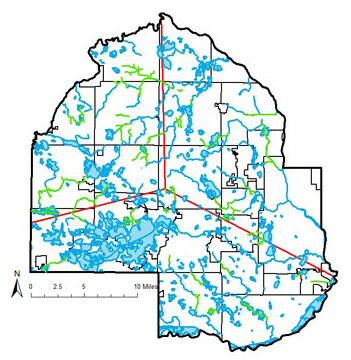Hennepin County cost-share grants
Funding and technical assistance is available to landowners for projects that improve water quality by reducing erosion and controlling stormwater runoff. Contact Kevin Ellis at kevin.ellis@hennepin.us for more information.
Landowners may receive funding of up to 75 percent of the total eligible costs of installing a conservation practice. All practices must be approved prior to construction. Landowners will be reimbursed when the project is complete.
Eligible projects
Projects that reduce stormwater runoff, stabilize eroding areas, protect shorelines from erosion, and reduce wind erosion are eligible. Projects must be designed to be effective for at least 10 years.
To learn more, go to Cost share for conservation: Common practices to reduce erosion, improve soil health and water quality (PDF, 2MB).
Current priorities for cost-share funding
Hennepin County is encouraging the use of practices that improve soil health, including planting cover crops and reducing tillage. Agricultural landowners or operators can receive funding and support to try effective practices that stabilize soil and make yields more consistent and sustainable over time.
Project selection
Annual funding for this program is very limited. Hennepin County works hard to ensure that the funding is well-spent on projects that have the most impact and address the county’s priorities.
To evaluate projects, county staff work with residents to describe the project, estimate the cost, and estimate a quantifiable conservation benefit.
Potential projects are reviewed no more than once per quarter, and county staff make decisions about proceeding with projects after this review. If a project is not selected, it may be put on hold for future consideration if the resident is still interested or declined if county staff don’t funding the project is feasible.
Technical assistance
Landowners participating in the state cost-share program receive technical assistance from natural resources staff. Assistance includes:
- Conducting site visits and determining the best practices to install
- Surveying and designing the project
- Producing a rough cost estimate
- Providing the landowner with a designed plan for submission of bids
- Meeting with the landowner and contractor prior to construction
- Supervising construction
- Certifying completion of the project
Soil health program
Hennepin County has funding and support to promote soil health. There are several ways to improve soil health, such as reducing tillage, adding cover crops, and adding diversity to the crop rotation. Farmers who improve soil health see many benefits: stabilized soils, improved soil fertility, reduced need for inputs, and yields that become more consistent and sustainable over time.
Learn more about Hennepin County’s Soil Health Incentive Program (PDF, 1MB).
Or, if you want more information about what soil health is and how it can benefit your fields, visit the Natural Resource Conservation Service (NRCS) website.
Agricultural best management practices loan program
Farmers, rural landowners and agricultural supply businesses can apply for low-interest loans through Hennepin County to make improvements or implement practices that will reduce or prevent nonpoint source pollution. The county works with local banks to provide these loans.
Eligible projects
- Animal waste control systems, such as runoff control structures and agricultural waste systems or pits
- Practices that reduce erosion from runoff, such as grass waterways, erosion and sediment control basins, and terraces
- Purchase of conservation tillage equipment, such as chisel plows, no-till drills, and no-till planters
- Upgrades and improvements to existing individual sewage treatment systems in rural areas
Ineligible projects include conservation practices that are not agriculturally related, refinancing of existing facilities, structures, and equipment, or projects started or equipment purchased prior to loan approval.
For more information and to apply
Loans are awarded as funding is available. Applications are accepted year round. Individuals will be required to complete the Agricultural BMP (Best Management Practice) Loan Program application as well as complete a loan application with a bank of their choice.
For more information about the loan program or to apply for funding, contact Kevin Ellis at kevin.ellis@hennepin.us.
Hennepin County natural resources grants
Grants are available to landowners for projects that preserve and restore natural areas and reduce the amount of nutrients and sediment flowing into lakes, streams, and rivers. Common projects include rain gardens, swales, and other projects to slow stormwater runoff, prairie and native vegetation restoration, and streambank stabilization and erosion control. Learn more about the natural resources grants.
Well sealing cost share
Property owners can recover a portion of the cost they pay to seal wells that are no longer in use through the well sealing cost share program. Eligible property owners can receive reimbursement of up to 75 percent of the well sealing cost, not to exceed $2,000 per well. Learn more about the well sealing cost share program.
Minnesota Agricultural Water Quality Certification Program
The Minnesota Agricultural Water Quality Certification Program is a voluntary opportunity for farmers and agricultural landowners to take the lead in implementing conservation practices that protect water. Those who implement and maintain approved farm management practices will be certified and in turn obtain regulatory certainty for a period of ten years.
Through this program, certified producers receive:
- Regulatory certainty: certified producers are deemed to be in compliance with any new water quality rules or laws during the period of certification
- Recognition: certified producers may use their status to promote their business as protective of water quality
- Priority for technical assistance: producers seeking certification can obtain specially designated technical and financial assistance to implement practices that promote water quality
Contact Roz Davis at rozalyn.davis@hennepin.us if you are interested in getting certified.

